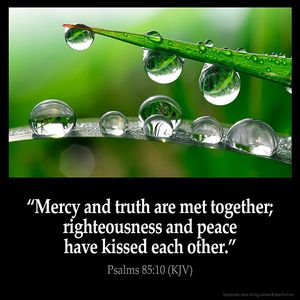Franciscan Fractal
Contemplating Today’s Culture through the Eyes of St. Francis & the Life of Christ
“Truth – What is It?"
“I will listen to what the Lord God is saying,
for he is speaking peace to his faithful people
and to those who turn their hearts to him…
Mercy and truth have met together;
righteousness and peace have kissed each other.
Truth shall spring up from the earth,
and righteousness shall look down from heaven.”
Psalm 85:8-10,11
In 2005, Stephen Colbert on his then news satire television program, “The Colbert Report,” coined the term “truthiness,” meaning a statement that was not actually true but represented a reality that the speaker wished to embrace. Not much has changed today, as anything that comes close to exposing an underlying “truth” seems to be dismissed as “fake news.”
In a country that is proliferating with “truthiness,” truth is not only hard to identify, but also hard to substantiate. News reports, podcasts, and blurbs contort facts with preconceived ideas without any documented basis in reality. The outcome of such fabrications is that truth becomes a statement of whatever you want it to be. “You can have your truth, and I can have mine. Both have equal credibility. Right?” Something seems suspect about even writing those words. Most people can detect the inherent “fishiness” in such a statement; however, many honestly have difficulty ferreting out how to correct those misperceptions.
To be authentic, truth is something that is reliable, trustworthy, and reflects the real nature, not only of the world, but also of God. Truth is everlasting. What is true today must also be true yesterday, and tomorrow. It is only our ideas about truth that can change. For Christians, it is the Bible that connects truth with righteousness and morality, and that is done through the life of Jesus the Christ. As Jesus said to Thomas, “I am the way, and the truth, and the life.” (John 14:6)
Truth gives us a standard for ethical behavior, and a foundation for distinguishing between right and wrong as we attempt to care for ourself, others, and the world. The application of telling the truth has an additional challenge for us, since it requires incorporating the active virtues of prudence, justice, fortitude, and temperance. Equally important in a world longing for enduring peace, truth must always be disclosed.
While volumes of material have been written on the philosophical concept of “truth,” the early religious reformers took a serious look at truth from a theological point of view. Martin Luther posited that truth existed independently of human perception, and continues to exist as a fixed entity, regardless of whether or not we understand it. Our understanding of truth is limited by our perspectives, experiences, and the passage of time. Luther emphasized that we can only acquire a small portion of eternal truth given the vastness of God’s truth and the limitations of our human knowledge.
Speaking the truth is liberating and transformational. Jesus said, “The truth will set you free.” (John 8:32) Truth liberates individuals and groups from narrow perspectives, and leads to Wisdom. Wisdom involves more than just accumulating facts or expounding beliefs. It offers a new way of seeing and knowing reality. While some religions fail to move past information gathering, true wisdom involves a deeper level of knowing and integration that goes much beyond church doctrines or societal laws.
Despite the denial of many, truth often comes from those who speak from the margins of society rather than centers of power. Moreover, it is not only the denial, but also the invisibility of the marginalized. Meaningful questions and clarity can be found in places where things are not going well. Inviting God into these situations can be transformative and healing.
Fr. Richard Rohr, a Catholic Franciscan Priest, reflects on how to sharpen our skills in seeking truth, not only through Scripture, but also in developing truth-seeking skills in our daily lives. This work involves embracing the hardness of truth. Avoiding truth in our own daily lives prevents us from seeing the truth in other areas of society and in the world. When we live without the truth of honest reflection, we learn little. We thwart the inward journey of seeing how “untruthful” our own lives have become, and, hence, are unable to see God’s truth in the rest of the world.
Fr. Rohr offers several of the absolute truths that we all experience, and yet hide from in our consciousness. Denial of these absolute truths blocks us and the church from fully living out the Gospel and seeing truth as God sees it. They are: 1) life is hard; 2) you are not as important as you think (or the world does not revolve around you); 3) your life is not totally about you; 4) you are not in control; and 5) you are going to die. These are harsh truths – truths that only Christ can conquer.
Encountering and accepting these realities begins to ground oneself in God’s truth and ultimately in peace. It is a process that allows you and me to perceive truth more fully in a world that seems to daily confuse us. While this is not always a pleasant task, it is a concrete beginning for those who seriously want to address a society and world that is drowning in misinformation and has lost its ability for truth-telling. All change in the world begins with change inside one’s self.
Remember, truth is a dynamic process and action of engaging with reality. It is a journey of letting go of your limited perspectives, embracing challenging realities, and finding liberation and deeper connection through experience and acceptance. It is through the life of Jesus the Christ that we are supported in this journey.
Prayers and Blessings,
Fr. John


